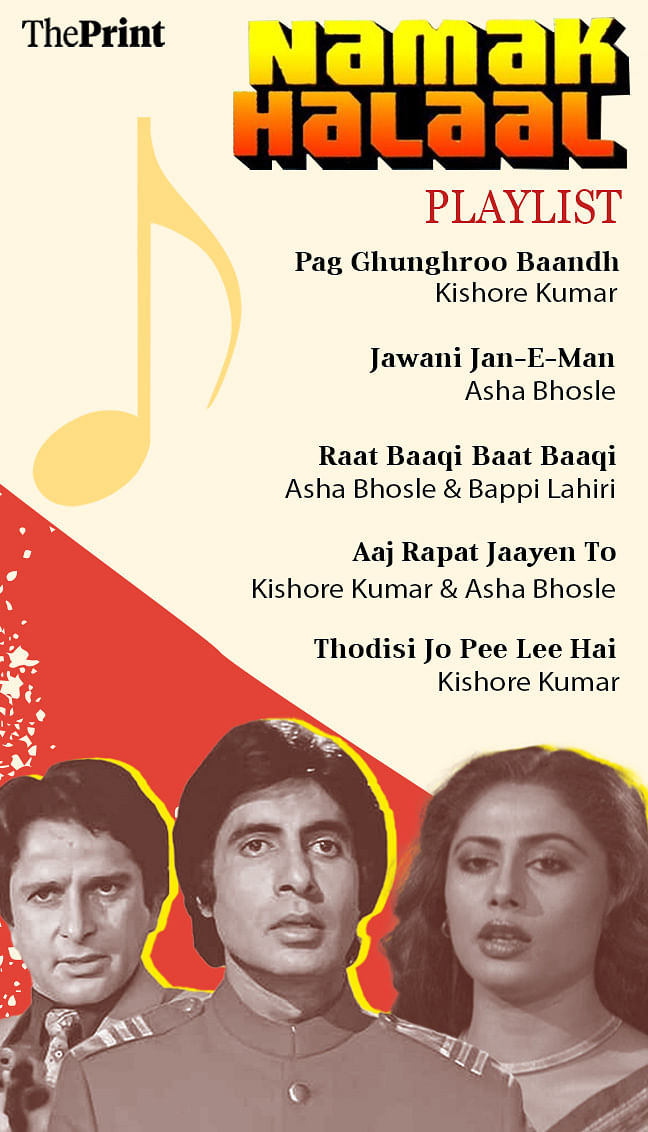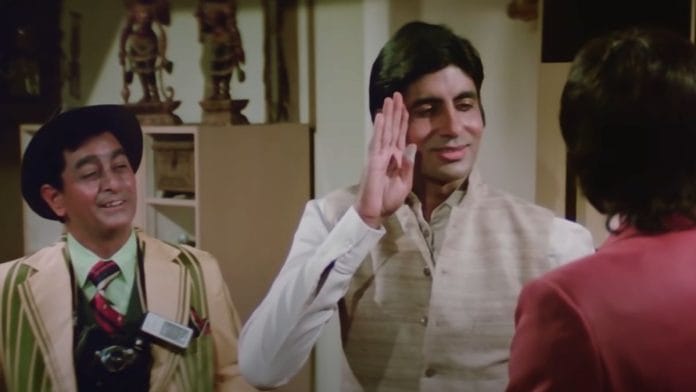As heavy rain pours, Smita Patil and Amitabh Bachchan dance and lip-sync to the song, Aaj Rapat Jaayen To. Sung by Kishore Kumar and Asha Bhosle, it remains one of the most memorable songs from Prakash Mehra’s 1982 film Namak Halaal—the title translates to “loyal servant”.
Though the entire music album is pure gold, Aaj Rapat Jaayen To stands out. It was the first time Patil—who plays the role of Poonam—stepped out of her comfort zone to pull off a sizzling dance number. But it wasn’t easy. It took her time and a lot of persuasion from Bachchan to be comfortable on the sets of Namak Halaal.
Patil was widely appreciated at the time for her performances in art films like Mandi (1983), Arth (1982), Mirch Masala (1987), and Manthan (1976). She wasn’t a glamorous doll like her peers Zeenat Aman and Parveen Babi who stole hearts and headlines with their savvy dance moves and flashy outfits.
However, Patil changed her career trajectory in the 1970s and took up commercial film projects, breaking her small film-only rule.
“I remained committed to small cinema for about five years … I refused all commercial offers. Around 1977–78, the small cinema movement started picking up and they needed names. I was unceremoniously dropped from a couple of projects,” she said in an interview.
This affected Patil to a great degree. She had turned down commercial offers and big paychecks because of her commitment to small cinema, only to be rewarded with disappointment.
“I told myself that here I am … If they want names I’ll make a name for myself. So I started and took whatever came my way.”
Patil signed up for Namak Halaal because she wanted to experiment but little did she know it wasn’t a bed of roses—she wasn’t used to Bollywood-style dancing. According to some reports, after shooting the song, Patil rushed home, locked herself up, and cried. It was Bachchan who later convinced her that in order to convincingly pull off such dance numbers, she had to convince herself about them first.
In one of his blog posts from 2016, Bachchan revealed that Patil was uncomfortable throughout the film’s shoot.
“The exceptional Smita Patil … was so uncomfortable during the shooting of the entire film because she just could not understand why she was asked to do what she was asked to do in the film. But she did it with a lot of personal persuasion from me and it came out fine,” he wrote.
Apart from Namak Halaal, Bachchhan and Patil went on to work in two other films—Shakti (1982) and Pet Pyaar Aur Paap (1984).
A musical treat
One of the primary reasons behind Namak Halaal’s enduring appeal is the soundtrack composed by Bappi Lahiri. All its songs turned out to be big hits—they are memorable even today. But one of the tracks angered Kishore Kumar.

When Lahiri pitched the song Pag Ghunghroo Baandh to his uncle Kumar, the legendary singer got angry after learning it was a 12-minute-long song.
“He got annoyed and said, ‘What is this? Is this a song?’” Lahiri recalled during a 2019 interview with Anupama Chopra.
It was the longest song ever featured in Hindi a film. The record was broken in 2002 by The Medley Song—sung by Udit Narayan, Sonu Nigam, Lata Mangeshkar, and Pamela Chopra—in the film, Mujhse Dosti Karoge!, which was 12 minutes 6 seconds long.
Another song from Namak Halaal that remains iconic is Jawani Jan-E-Man—featuring the iconic Parveen Babi in a gold catsuit.
In the movie, Rajkumar (Shashi Kapoor) is the owner of a hotel. He is unaware that a plot to kill him has been hatched by his manager Ranjit (Ranjeet Singh). It involves a honey trap in the form of Nisha (Babi).
Nisha initially plays hard to get. When Rajkumar sends her a bouquet, she responds with a cactus plant.
As is common among men who are not used to rejection, Rajkumar is left puzzled at first, only to get thoroughly smitten with Nisha.
Also read: Rekha’s Khoon Bhari Maang showed revenge doesn’t have to be violent—it can also be fashionable
English is a funny language
A powerful monologue can make a film memorable—be it Shah Rukh Khan’s “70 minute” monologue in Chak De! India (2007), Karthik Aaryan’s “Problem yeh hai ki voh ladki hai (the problem is that she is a girl)” in Pyaar Ka Punchnama (2011), or Sunny Deol’s “Tareekh par tareekh” in Gadar (2001). But none of these come close to Bachchan’s “English is a very funny language” monologue in Namak Halaal.
Bachchan has several iconic dialogues under his name from the films Deewar (1975), Don (1978), Kaalia (1981), Shahenshah (1988), and Zanjeer (1973)—all of them complimenting his ‘angry young man’ image.
But in Namak Halaal, he made his audience break out in laughter.
In the film, when Arjun (Bachchan) comes to meet Ranjit in search of a job, the latter asks him whether or not he knows English.
In response to this, Bachchan performs his famous monologue: “You see sir, I can talk English, I can walk English, I can laugh English, I can run English because English is a very funny language…”
While Bachchan has been rightly applauded for his dialogue delivery, the dialogue writer is not widely known. It was actor Kader Khan who wrote the dialogue in Mehra’s film.
Namak Halaal ends in a predictable, filmy manner.
When goons kidnap Arjun’s and Rajkumar’s families and blackmail them to transfer all their property to Ranjit’s name, the heroes manage to beat all the bad guys and save everyone.
In the end, Rajkumar marries Nisha, Arjun marries Poonam, and the heroes reconcile with their mother Savitri (Waheeda Rehman).
A typical Bollywood masala film, Namak Halaal went on to mint big bucks at the ticket counter. It became the third highest-grossing movie of 1982, earning Rs 12 crore.
Later, it was remade in Telugu as Bhale Ramudu (1984) and in Tamil as Velaikaran (1987). The song, Raat Baaqi Baat Baaqi, has been recreated by Tanishk Bagchi for the 2017 film Ittefaq.
(Edited by Prasanna Bachchhav)







This article is slighlty off-track. It starts with a brief about the unknown writer Kader Khan. The expectation is that the detailed article will have information about him. There is nothing but a similar mention like that in the article. The expectation and reality has a huge gap.
Plus, the writer does not seem to have done proper research. Tareekh pe tareekh dialogue was from the movie Damini and not Gadar.